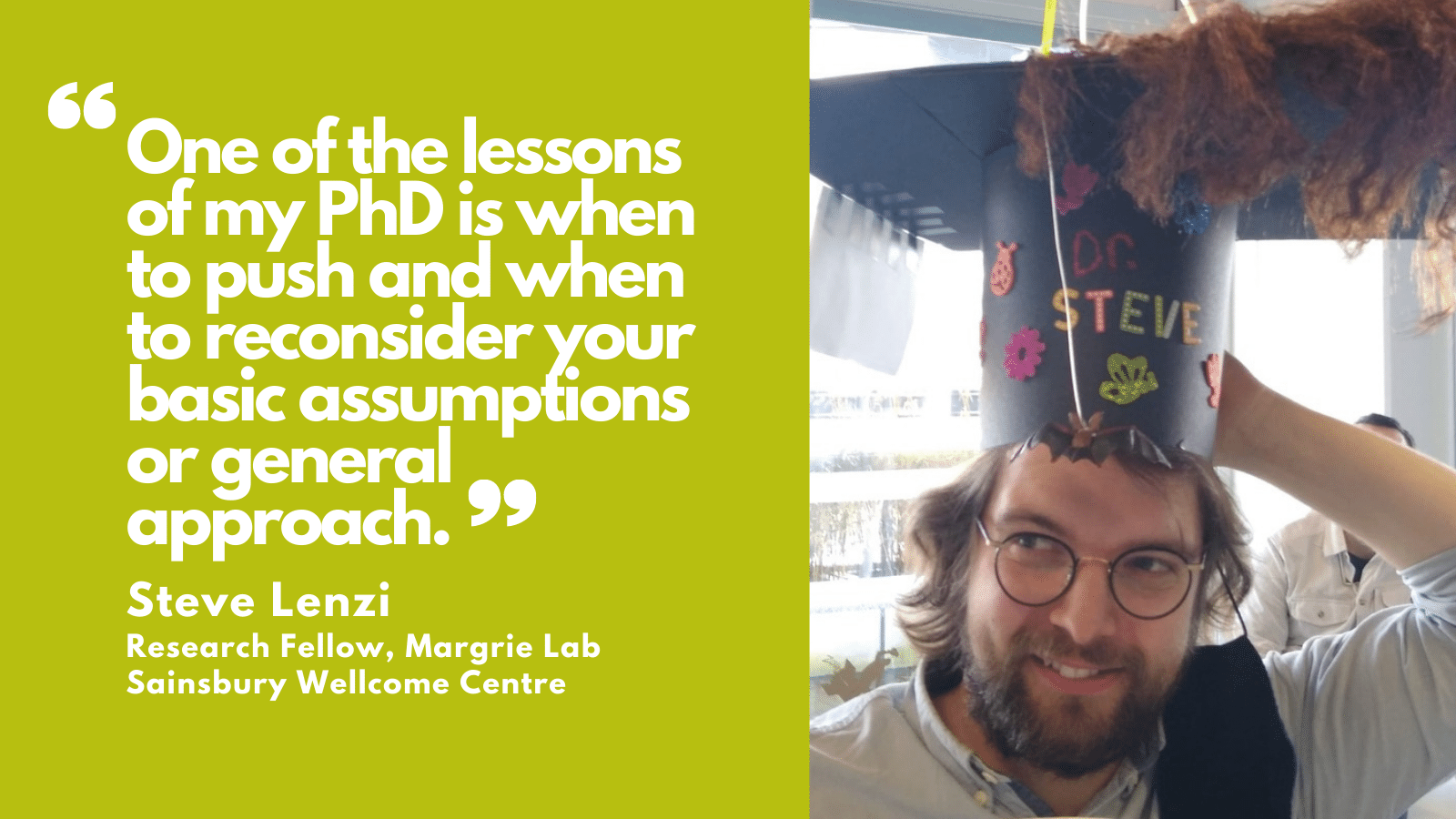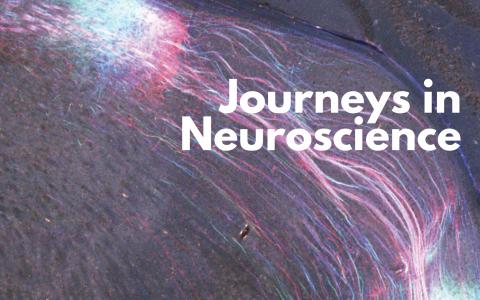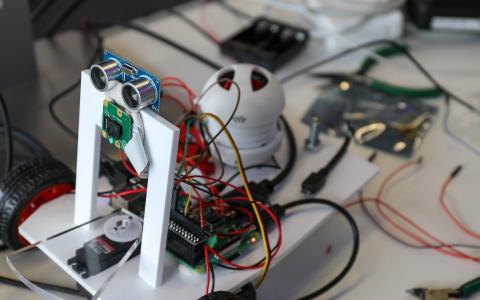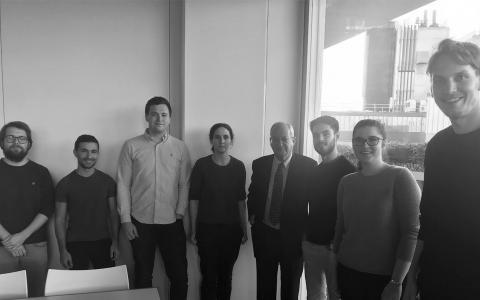
What is a neuroscience PhD really like?
An interview with Steve Lenzi conducted by April Cashin-Garbutt
Steve Lenzi, the first ever SWC student to be awarded their PhD, shares his journey in science so far and some of the highlights during his time as a PhD student in the Margrie Lab at SWC.
What does it feel like being the first ever SWC student to be awarded their PhD and what was the process like?
A PhD is something you constantly work towards for a long time and it is really nice to close that chapter. In a way I feel relieved that it’s finished! I think the process is interesting and probably varies from student to student. At the beginning you don’t necessarily know all of the details of what you’re going to be doing. You need to do experiments along the way and think about the results to identify interesting areas to flesh out with further study. Also, it’s not a given that everything you plan initially is going to work as smoothly as you intend, and you need to adapt as things move forward. So the results can influence the process to some degree.
Broadly speaking, I spent some time working in the lab beforehand to see what kinds of projects were going on and to refine my interests. I started planning my project and discussing it with Troy Margrie, Group Leader of the lab, and wrote a research proposal based on that. Then I got to work setting up the behaviour, performing experiments and analysing data, working together with a post-doc in the lab, Lee Cossell. There are stages along the way where you present your data to a committee to get feedback and write up some of your experiments to keep you on track. Then, once you have enough material you can focus exclusively on writing up and polishing figures and pulling everything together.

What were some of the key highlights of your PhD?
Probably some of the best moments were in the early stages of our behavioural experiments. You don’t really know what’s going to happen when you’re watching mice react to stimuli for the first time. The uncertainty about what the results of an experiment are going to be is exciting and if you’re so inclined there’s room for betting a pint or two on what you think the outcome will be! On the other hand, getting down into the detail and making a convincing case for your hypotheses is also really satisfying.
How did lockdown affect your PhD?
Lockdown was challenging as it came at a point where I was wanting to do some final experiments for my PhD thesis, but then I had to make some difficult judgement calls about what I could feasibly do within the new timescale. On the other hand, lockdown also helped me focus more exclusively on writing my thesis – so it wasn’t the worst timing for me!
Sometimes when writing you identify areas that are worth exploring further. Fortunately for me, the areas I wanted to explore were analytical aspects that I could get out of the data I already had rather than performing additional experiments.
What were some of the hardest parts?
The hardest part of my project was probably somewhere in the middle, we had developed a nice behavioural assay early on but trying to show which brain regions are crucial for it proved to be more challenging than anticipated and some things didn’t really work at first.
It is challenging when you get to a point where something isn’t working, and you need to decide whether to double-down or try something different – those are difficult choices.
What did you do to overcome those difficulties and how did the team at SWC help you get through the hard times?
Interaction with other people and good supervision are essential. If something isn’t working, it is tempting to refine things or try harder and invest more time and try to figure it out, but that is not always the right option. One of the lessons of my PhD is when to push and when to reconsider your basic assumptions or general approach. There’s a trade-off between pushing further into something and re-evaluating – that’s where good supervision from someone with a lot of experience, like Troy, makes a big difference.
Can you tell us more about your thesis “A role for the tail of the striatum in the adaptive control of innate escape”? What did you discover?
My thesis focused on how learning influences and guides innate behaviours. A lot of organisms exhibit innate behaviours, which means they are predisposed to perform particular behaviours without any previous experience. However, the majority of information that guides behaviour has to be acquired during life so can’t be inherited in this way. It’s not well understood how learning tailors innate behaviours to the ever changing circumstances an organism encounters during its lifetime.
The approach I took was to study innate escape behaviour using an overhead expanding dark disk, called a looming stimulus, that is thought to simulate a predator moving towards the animal from above. Mice run away and hide when they encounter a looming stimulus even if they have never seen one before. We devised a behavioural paradigm that enables us to rapidly induce a learned suppression of this escape response. Once mice have gone through our protocol, they no longer run away in response to looming stimuli while escape to other kinds of threat remain intact.
We then used this as a tool for screening different brain regions to figure out what, if anything, they contribute to this regulation of loom evoked escape behaviour. In this exploratory phase we inactivated different brain regions and observed whether this alters the learning process or the behaviour before and after the learning process. Using this paradigm and other approaches we identified a sub-circuit of basal ganglia that seems to be important in this learning and then we studied how it’s involved and what it might contribute.
Will you publish your findings in a journal?
Yes, we’re working on this at the moment, starting with our behavioural results and their ethological relevance. After we’ve published the behavioural results, we aim to publish our physiological results too. I am planning to stay at SWC for a while and it will take some time to tie everything up and publish.
What was the most surprising thing you learnt overall during your PhD?
I guess in a way everything you do during a PhD is surprising! If you are not doing any experiments that surprise you, you’re probably not doing it right! That said – it is very satisfying when the results of an experiment are exactly what you predict based on the literature.
A fundamental observation of my PhD is that mice suppress their escape response, and they learn to do it robustly and over a short period of time. In approximately 15 minutes a mouse will learn to suppress its innate escape response and even two weeks later the response remains supressed.
It is surprising to think that a behaviour whose execution is thought to be crucial to survival can also be so flexible. Perhaps more surprising was that the suppression of escape lasts for such a long time as one might expect such suppression to be highly transient to prioritise successful escape but this doesn’t seem to be the case.
What was the viva process like?
In hindsight, I worried more about my viva than I should have done! You are talking to two people who genuinely want to discuss what you’ve done and how you think about it so if you can get over the obvious stress of being examined its actually quite a nice event that you can learn from.
Beforehand, there is a lot of uncertainty about what happens in a viva as it depends on your examiner, what you’ve done and a large number of other factors.
In the end, I enjoyed the viva process as I was discussing my project with people who were interested in my work. My examiners also challenged me and asked questions that I hadn’t necessarily thought about before and gave me an indication of how people in other fields might react to my findings. They also gave me ideas of where I might want to explore next with my future work.
What advice would you give to someone who has their viva coming up?
Read your thesis and think about why you did what you did – ultimately, that’s what you are most likely going to be asked about. It also helps to present your work to people regularly to identify the weak links in your narrative and to work out what kinds of questions other scientists have about your work.
When did you find out you’d passed and how did you celebrate?
My viva was virtual so the examiners put me in an online waiting room while they discussed and then brought me back in and told me I’d passed. Then I had some socially distanced celebrations! Our lab follows the German tradition of making a PhD viva hat, which is basically a big cardboard hat with a lot of inside jokes glued on top!
Do you have any general tips for those currently doing a PhD?
For your thesis, I would advise starting writing early as your ideas mature through writing. I’d also recommend thinking about chapters as early as you’re able to because once you’ve nailed the ordering you can see more clearly whether you are missing something. If you get this done early enough you can even do specific experiments to address what’s missing.
Do you have any advice for students considering whether a PhD could be the right step for them?
If you want to do a PhD and you’re determined, then go for it! It is not an easy ride, and it’s not for everyone, but it is very satisfying.
How do you pick the right lab and supervisor?
I went to meet the lab and presented my work from my Masters project. I spoke to Troy and other lab members to develop a sense of what the people are like. I’d definitely advise checking out lots of labs before you choose the one you’re going to do your PhD in as you are going to be there for several years! It is important to make sure you get the right fit.
What are your plans for the future?
At the moment I am carrying on with this project because I am enjoying it and I’ve got some more questions to polish off and then publish.
One of the nice things about finishing my PhD is that I can now devote some time to thinking about what I want to do next. I didn’t spend much of my time during my PhD thinking about next steps. The SWC is a great environment – I don’t have a strong incentive to leave just yet!


